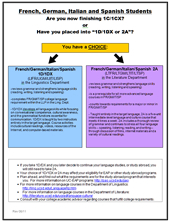Why study Spanish?
Over 300 million people speak Spanish in the world. Spanish is the official language of 21 countries and several transnational organizations such as UNESCO, the European Union, the Organization of American States and others. In the United States over 30 million people identify as Latinx. According to the United States Census Bureau, In California 39.1% of the population identify as LatinX/Chicanx. Moreover, the California Department of Education reports that Latinx/Chicanx students make up nearly 55 percent of all K-12 students. To put it another way, Latinx and Chicanx are the fastest growing population in California. UCSD has recognized this, and it is in the process of becoming a Hispanic Serving Institution (HIS).
With 16,000 publications, 250 TV stations and 5,100 radio stations, learning Spanish gives you access to a diverse and rich cultural universe. In addition, Spanish is a crucial language in the fields of journalism, medicine, education, public health, business and International relations, among others
Therefore, learning Spanish (or majoring in Spanish) is not only a tool that may give an edge in the labor market, but also an indispensable element to built a vibrant multilingual and multiethnic community in San Diego and California. If you are interested in learning Spanish
The Department of Linguistics offers introductory courses in Spanish.
The Department of Literature offers intermediate and advanced courses in Spanish
Where do I start?
- If you have never studied the language before, you should enroll in LISP 1A/AX
- If you have studied the language before, you may not enroll in LISP 1A/AX
- If you have studied the language before, consult with your college advisor about whether you need to take an online placement test. This test will determine which course is appropriate for you. Students who have taken AP exams in these languages or other college-level courses may not need to take the online placement test - again, check with your advisor.
- If you already understand and speak Spanish fairly fluently but you have never received a formal education in Spanish, you probably should enroll in LTSP 2D, a class designed for heritage speakers. Check with the Spanish language supervisor for proper placement.
Notes:
Literature majors who intend to continue their Spanish language studies (major/minor/EAP/etc.) should go directly to Spanish 2A after completing LISP 1C/1CX.
Heritage/Native speakers of Spanish should contact the Spanish language supervisor for appropriate placement.
How do I know whether to enroll in Linguistics 1D/DX or Literature 2A?
(See course Flowchart)
You have the choice if
- You have taken the UCSD Language Placement Test and have placed in Linguistics LISP 1D or Literature LTSP 2A.
- You have completed Linguistics LISP 1C/CX at UCSD
- You have had the equivalent of 1 year of the language at a 4-year college or university.
- You have had the equivalent of 3 semesters of the language at a community college.
Literature majors who have completed Linguistics LISP 1C/1CX (or the equivalent) should go directly into Literature LTSP 2A.
You may want to enroll in Linguistics 1D/DX, if
- You need a terminal course to satisfy the language requirement for Revelle College and you would like to complete this requirement with the emphasis that 1D/DX offers (see below).
- You need another course to satisfy a 3-course language sequence for Roosevelt or Muir Colleges and you would like to complete this requirement with the emphasis that 1D/DX offers (see below).
- You want additional conversational exposure before going on to Literature 2A.
You may want to enroll in Literature 2A, if
- You need a terminal course to satisfy the language requirement for Revelle College and you would like to complete this requirement with the emphasis that 2A offers (see below).
- You need another course to satisfy a 3-course language sequence for Roosevelt or Muir Colleges and you would like to complete this requirement with the emphasis that 2A offers (see below).
You are advised to enroll in Literature 2A, if
- You plan to pursue a Major or Minor in the literature of that language within the Literature Department.
- You plan to pursue the Language Studies Major or Minor for that language within the Linguistics Department.
- You plan to participate in an EAP or OAP program that requires intermediate language competence.
